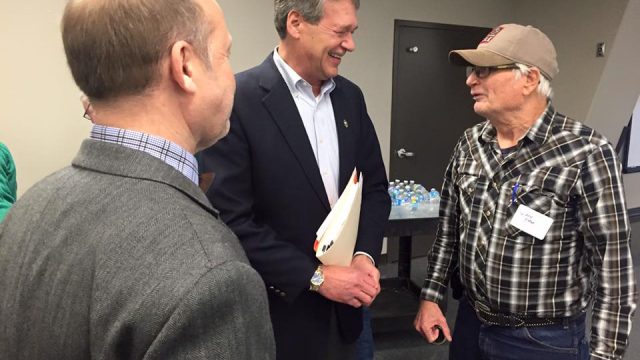Wayne Stenehjem's Weak Spot: North Dakota's Changing Economic And Budget Situation

A friend of mine who works as a pollster told me during the 2014 election cycle that he thought the Republican hold on state government would continue until the number of North Dakotans saying the state is on the “right track” falls substantially.
I agreed with that. When the status quo is good, voters feel very little incentive to vote for something different.
Well, things have changed in North Dakota, and yesterday as I listened to gubernatorial candidate Rick Becker speak in Minot (my post on that here), I got to thinking about what my friend said. Especially when I heard Becker saying Republicans had made a mistake when they handled the budget.
He also got in a jab at Stenehjem, noting that the Attorney General calls himself an “optimist” when it comes to the state’s economy and finances.
“I’m going to be realistic, not optimistic,” Becker said.
That sort of argument may get traction with an electorate suddenly confronted with headlines about revenue shortfalls and mandatory budget cuts, and Becker is hardly the only candidate in the gubernatorial race making it. Fargo businessman Doug Burgum has sounded this theme during our conversations a number of times.
“All those polls and rankings showing North Dakota as the best-run state, they’re in the past,” Burgum told me during a phone conversation this last week. “We need to focus on what’s ahead.”
And here we find what may be Attorney General Wayne Stenehjem’s weak spot. He is very much the status quo candidate. He has been the Attorney General for a long time – since 2000 – and he was a state lawmaker for decades before that. His resume for the governor’s office is built upon North Dakota’s past success.
That’s a perfectly valid and compelling thing for Stenehjem to campaign on. But, again, things have changed. There may be no trend line of data more illustrative of that change than the one showing the state’s general fund appropriations over the last 20 years (data pulled from the Legislature’s Budget & Fiscal Trends reports):
The spending cuts in the current biennium – particularly those coming as mandatory allotments triggered by that ugly, no-good revenue forecast released this last week – are the first time the state has had to reduce biennium-over-biennium spending in a long time.
Republicans, and particularly our Republican governors, have invested a lot of time taking credit for the state’s revenue surpluses and strong economy and low unemployment. Now those surpluses are gone, unemployment filings are spiking, and the state is making national headlines thanks to a slowing economy.
North Dakota’s voters haven’t had to think about those things in a long, long time.
Do you think that might impact how the voters feel about the state’s political status quo?
Let’s be clear: the sky isn’t falling. The state has ample reserves, there’s plenty of fat in state budgets to cut, and so far there are still plenty of job openings.
Even so. Voters who aren’t impacted directly by the slowdown in the state’s economy are still going to perceive things differently.
That might just change how they vote.
Ironically, if that happens, Democrats aren’t exactly in a position to capitalize. Their only serious gubernatorial candidate dropped out of the race, and in a year where there are three partisan races absent incumbents on the statewide ballot, Democrats are struggling to find someone – anyone – to run.
But Becker and Burgum are in a position to capitalize, and that’s Stenehjem’s challenge.





